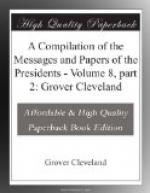INAUGURAL ADDRESS.
Fellow-Citizens: We stand to-day upon an eminence which overlooks a hundred years of national life—a century crowded with perils, but crowned with the triumphs of liberty and law. Before continuing the onward march let us pause on this height for a moment to strengthen our faith and renew our hope by a glance at the pathway along which our people have traveled.
It is now three days more than a hundred years since the adoption of the first written constitution of the United States—the Articles of Confederation and Perpetual Union. The new Republic was then beset with danger on every hand. It had not conquered a place in the family of nations. The decisive battle of the war for independence, whose centennial anniversary will soon be gratefully celebrated at Yorktown, had not yet been fought. The colonists were struggling not only against the armies of a great nation, but against the settled opinions of mankind; for the world did not then believe that the supreme authority of government could be safely intrusted to the guardianship of the people themselves.
We can not overestimate the fervent love of liberty, the intelligent courage, and the sum of common sense with which our fathers made the great experiment of self-government. When they found, after a short trial, that the confederacy of States was too weak to meet the necessities of a vigorous and expanding republic, they boldly set it aside, and in its stead established a National Union, founded directly upon the will of the people, endowed with full power of self-preservation and ample authority for the accomplishment of its great object.




